PCV Letter from Madagascar: “Nothing here is easy.”
PCVs in the news
I’d like to say that living in Madagascar has made me strong, but even the 12-year-old girls put me to shame.
by Vanessa Paolella (Madagascar 2023-25)
Lewiston Maine Sun Journal
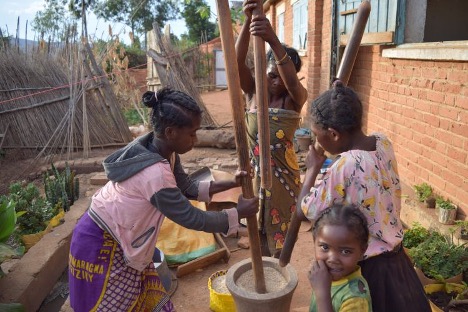
Twelve-year-old Tsoavana, 15-year-old Faneva and their mother, Ramartina, pound rice in tandem to separate the husk from the grain. The family was paid to prepare the rice, a laborious process, in preparation for my 23-year-old neighbor’s birthday party several months ago. Vanessa Paolella photo
I thought I knew what it was like to work hard.
When I was a student at Bates College, I balanced a science-heavy course load while managing the college newspaper and competing in three varsity sports. Most days, I left my dorm at 7 a.m. and didn’t return until nearly midnight because I had so much to do. It was exhausting.
Then, I came to Madagascar and learned how much more difficult life can be.
Nothing here is easy. Preparing rice for dinner is often an hours-long process. All laundry is washed by hand. And for many people, even buying something as simple as an umbrella necessitates biking 16 miles on rough dirt roads.
And then we have folks in Maine who think walking to Lisbon Street from the Lincoln Street parking garage is too much effort.
Yes, I have these sorts of thoughts quite often.
It’s not just the adults, either. I am regularly put to shame by 12-year-old girls who haul water like it’s air and wield shovels as deftly as their American counterparts navigate TikTok.
Often, students walking by my garden simply grab the shovel from my hands and do my work for me out of pity.
I’d feel embarrassed if I weren’t so impressed. Digging holes for Holly Ewing’s soil class my senior year at Bates simply wasn’t enough to prepare me for this kind of hard labor, despite her best efforts.
To be clear, my life is as easy as it gets in Madagascar. I buy all of my rice ready to boil, and my water pump is located just 15 feet from my house. When I walk or bike to Ambalavao, I do so knowing I could have easily afforded the $2 round-trip fare.
The people around me, however, don’t have the same resources as I do. Those who don’t work hard don’t eat. After all, many families grow most of their own food.
But even those who are diligent sometimes go hungry.
Three weeks ago, I walked to Ambalavao with my wonderful 20-year-old friend Sarobidy, her mother and her friend to sell fruit.
I knew they had no plans to eat lunch that day. But what I didn’t realize was that they hadn’t eaten breakfast, either. Money was tight, and their rice fields weren’t yet ready to be harvested.
Their first proper meal that day came only after selling fruit all day and walking 16 miles round-trip with babies and goods in hand. That’s like walking from downtown Lewiston to Gray via Route 202. Dark had already fallen by the time they lit their charcoal stove.
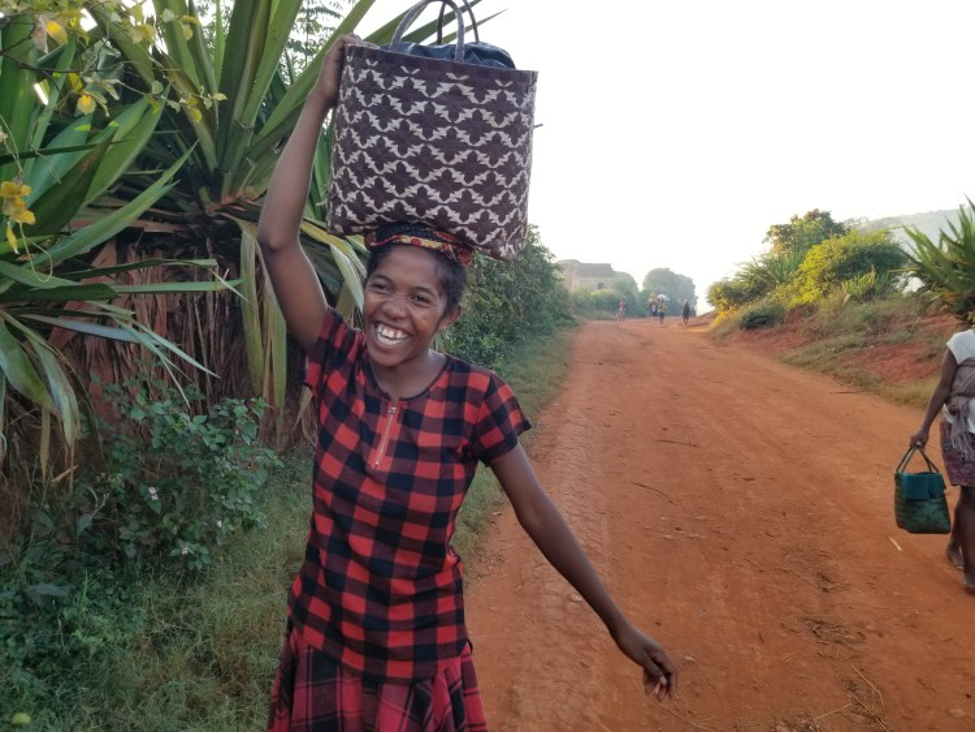
My friend Sarobidy carried a 15-pound bag of guava on her head for most of the 8 miles to Ambalavao three weeks ago. This is a common method for transporting heavy good here. Vanessa Paolella photo
It was a grueling trip, with little reward. For all their effort, Sarobidy and her mom earned the equivalent of less than 50 cents selling guava and unripe papaya.
That Wednesday was full of highs and lows. I feel privileged to have been able to learn more about the experience of market sellers here, while knowing my next meal wasn’t contingent on the profits.
But sometimes, I also feel a sense of hopelessness for my friend, her family and others around me. In a country as poor as Madagascar, even those who work hard struggle to make ends meet.
There are few jobs here, especially in the rural areas. And even if you’re lucky enough to find one, the pay is often inconsistent. My host sister’s husband, a security guard for the commune, hasn’t received a paycheck in nearly a year.
Even so, Sarobidy and her family are trying. They recently built two food stalls in front of their house to sell fried bread and fruit.
Today, while hanging out in my house, Sarobidy told me that the profit on the bread is especially good. On market day, they usually sell about 100 of the palm-sized breads, earning a profit of 2,000 ariaries, she said, equivalent to just under 50 cents.
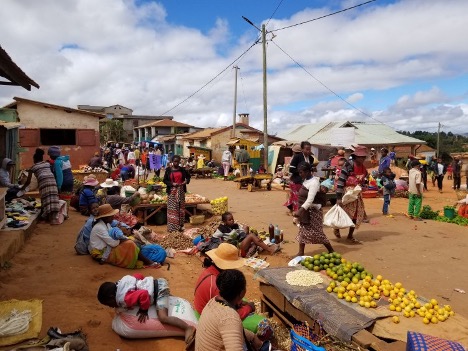
The scene at the weekly farmers’ market in Ambalavao at noon last Wednesday. Often, there’s too many sellers and not enough buyers. Vanessa Paolella photo
“That’s considered good?” I asked in disbelief. Two thousand ariaries is enough to buy three servings of rice.
But it’s not the only way they’re working to make money. Multiple times this past week, they walked over a mile to the river to collect sand for a wealthy family in town who is currently building a wall around their house.
I don’t know how much they were paid, but I do know the work was very, very hard.
Several times, Sarobidy was able to borrow a bike to help transport the heavy bags of sand. Other times, she carried the sack on her head. After making two trips last Monday morning, it worried me when she told me her head was hurting.
But I do have hope. Lately, we’ve been talking about other ideas for making money. Her family owns a cow that’s about to give birth, and she’s planning to sell milk and yogurt when it does.
We’re also going to try selling a simple bruschetta — Sarobidy thinks there would be buyers — and eventually we can grow everything except for the bread and cooking oil if it sells well.
As for me, I’ve been learning how to wield a shovel and haul water. I even have the blisters to prove it, much to the amusement of folks here.
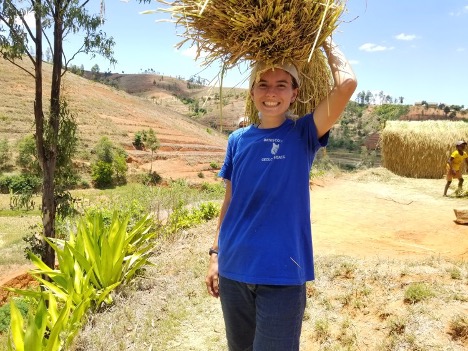
In December, I helped my host sister’s family harvest rice, a first for me. It was also the first time I had attempted to transport heavy things on my head, a common practice here. Vanessa Paolella photo
My arms may even have grown a bit of muscle, if you look close enough. Collecting water each morning for the seedlings in my garden no longer feels as difficult as it once did.
And for the first time this week, I built a (small) garden bed all on my own. It doesn’t sound like much. But with no rain in weeks, loosening the soil has been very slow going.
Still, I have a long way to go before the tween girls stop showing me up.
In fact, I’m pretty sure that day will never come.
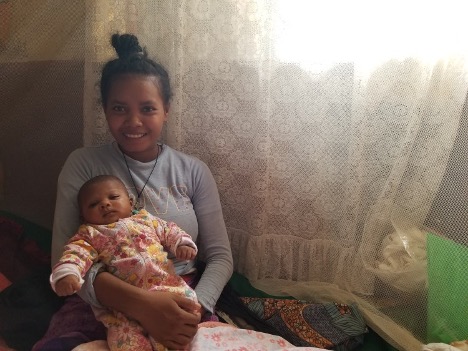
Fanja sits in bed with her daughter, Farantsa, now nearly 2 months old. Vanessa Paolella photo
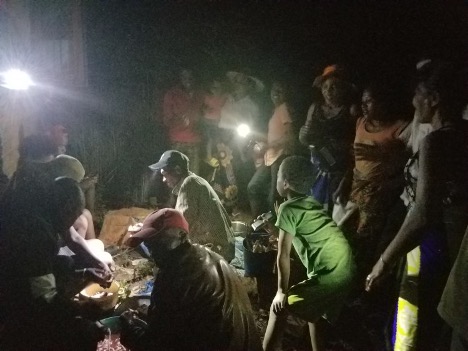
When I arrived home from Ambalavao three weeks ago, I found a chicken slaughter party in my backyard, music and dancing included. The chickens were to be the main course during a celebration for teachers the next day. Vanessa Paolella photo
• • •
Vanessa Paolella is a PCV in Madagascar, as well as a former award-winning staff writer for the Sun Journal, and a Bates College graduate.
No comments yet.
Add your comment